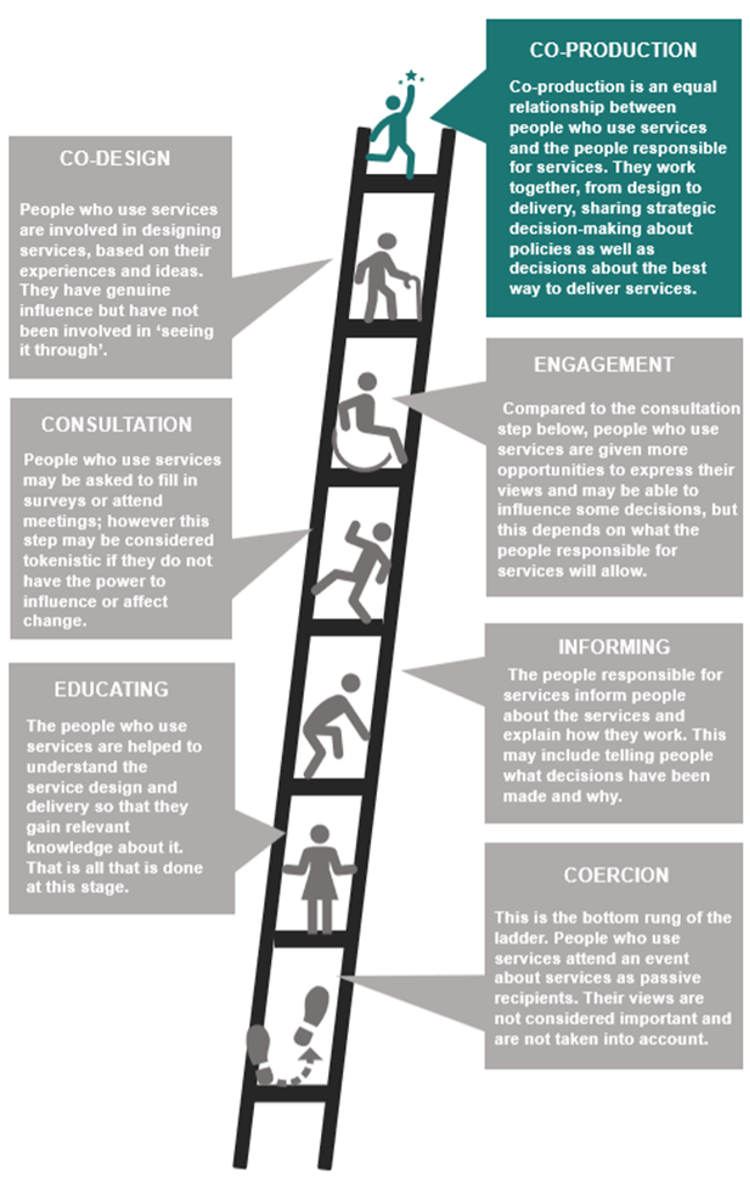
What is co-production?
Co-production plays a crucial role in our work and matters to us at Transformation Partners in Health and Care (TPHC), but what does it mean?
Co-production is defined by the Social Care Institute for Excellence (SCIE) as “working in equal partnership with service users, carers, families and citizens”.
A co-productive approach to service planning, delivery and improvement is value-driven and provides the opportunity for people with lived experiences to be part of public sector projects from inception to completion. A system shaped by patients, for patients.
The NHS Long Term Plan and statutory guidance require Integrated Care Boards (ICBs) and Trusts to ensure individuals and communities are appropriately involved in planning NHS services. We understand these principles and can advise on and implement suitable approaches, drawing on our wealth of experience in co-productive healthcare initiatives.
Why is co-production important?
Co-productive healthcare initiatives have several practical benefits:
- Improved service quality as services better meet the needs of a community.
- Enhanced user satisfaction and increased trust in public institutions due to greater transparency.
- Opportunity to reduce health and social care inequalities through engaging seldom-heard communities and ensuring their views, concerns and considerations are heard.
- More informed decision-making grounded in the insights and experiences of service users.
How does co-production work on a practical level?
People with lived experience having an equal role in decision-making, alongside NHS leaders, from the beginning of any improvement work may not always be the most practical or deliverable approach. If we can’t co-produce, for whatever reason, that’s OK! There are many ways in which we can still involve communities – set out in the ladder of involvement. This allows for flexible and adaptable involvement work that can reflect the needs of a particular project.
It’s important to be clear about the level of involvement and influence that local communities and people can have. Saying you are co-producing and then not co-producing can really damage relationships and create apathy towards working with us. Most work in the NHS isn’t really co-production – even though it might be labelled as this.
It’s also important to know that there are different ways to involve people – only one of which is co-production. It is a lot more resource and time intensive than other ways of involving people and needs leaders to share power – which may not always be practical or possible.
The involvement ladder

The next rung of the ladder is Informing. The people responsible for services inform people about the services and explain how they work. This may include telling people what decisions have been made and why. The next rung on the latter is Consultation. People who use services may be asked to fill in surveys or attend meetings; however, this step may be considered tokenistic if they do not have the power to influence or affect change.
The next rung is Engagement. Compared to the Consultation step below, people who use services are given more opportunities to express their views and may be able to influence some decisions, but this depends on what the people responsible for services will allow. The penultimate rung on the ladder is Co-design. People who use services are involved in designing services, based on their experiences and ideas. They have genuine influence but have not been involved in ‘seeing it through’. The final rung on the ladder is Co-production. Co-production is an equal relationship between people who use services and the people responsible for services. They work together, from design to delivery, sharing strategic decision-making about policies as well as decisions about the best way to deliver services.
Our work with co-production
Our Mental Health, Thrive Ldn, Transforming Cancer Services and Children and Young People teams are great advocates and practitioners of co-production. An analysis exploring psychological therapies for people with severe mental health challenges to understand barriers was informed and coproduced by lived experience practitioners. The practitioners conducted independent research with other service users, feeding their findings into the overall exercise. Service users were then involved in the prioritisation of resulting change ideas and quality improvement projects.
Our recent work on mental health pathways in a Police custody setting also included engaging patients, fine-tuning their ideas and incorporating them into a new way of working for Police Officers and health professionals.
How can I implement co-productive healthcare initiatives?
We have a range of experts within TPHC with a wealth of experience who would be happy to speak with you on co-productive healthcare initiatives. Please get in touch with us and we would welcome a chat to scope your needs and deliver impact together.
Where can I find out more?
Think Local Act Personal co-production ladder (pdf download)
NHS statutory guidance: Working in Partnership with People and Communities (pdf download)
FutureNHS Co-Production Workspace (for healthcare professionals)
